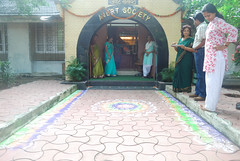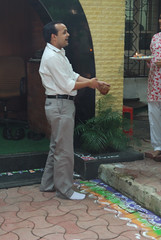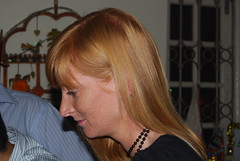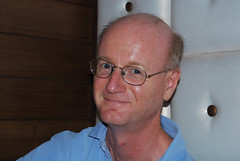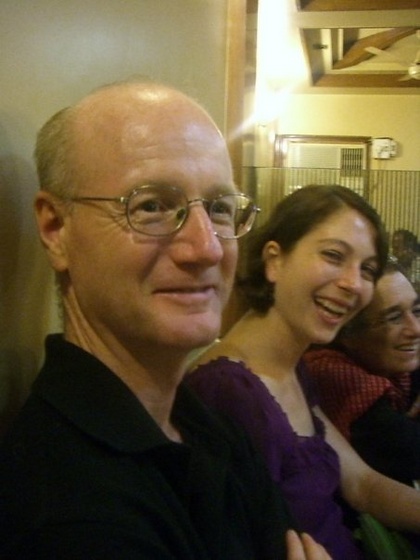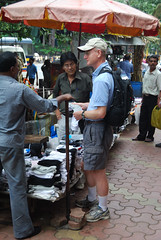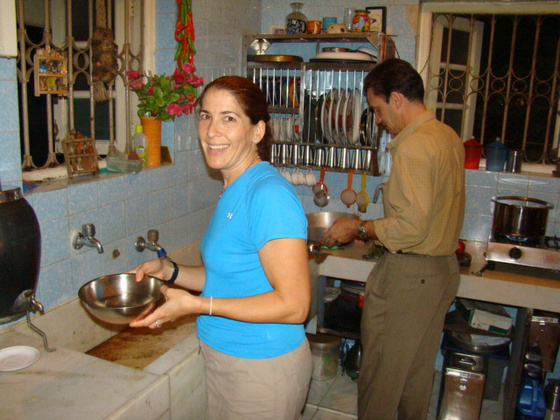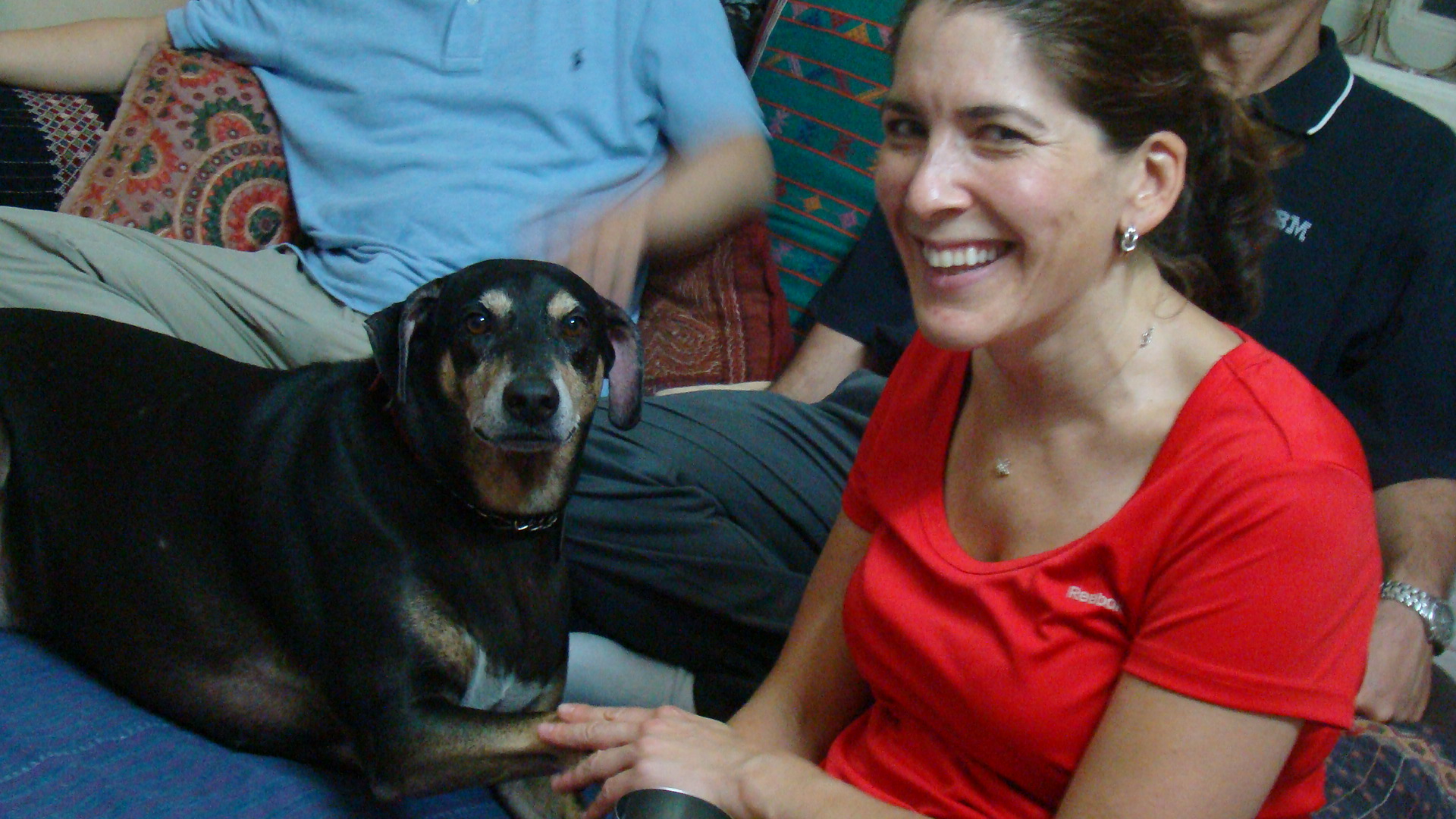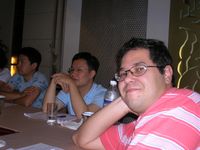Today afternoon our client took us off to the field to show us what they are doing out there. The places where the Avert Society work are all outside of the city of Mumbai, so our first station was Thane, a city north of Mumbai.
There we visited a bar with bar girls. Dr Raj who accompanied us explained to us that earlier the bar girls are more dance girls. They dance in the bars and earn a big deal of money with dancing. They were also at that time already sex workers, but only for part of their income. Then the home minister of the Maharashtra state issued a law that forbid dancing in the bars, so that the husbands "will not spend their money in the bars, but give them to their wives". Losing a big deal of their income now the bar girls are full time sex workers.
What Avert do is that they fund NGOs that directly work with the sex workers, distribute free condoms or social marketing condoms (on market condom costs 175 Rupees, they distribute them for 2 Rupees), do educations to the bar girls so that they recognize their risk and prevent themselves and teach them how to use condoms, and how to use condoms so that the unwilling customer don't notice (I found this part quite unbelievable, but later when I saw the place I think that maybe it is doable). They also give the bar girls other educations for example about their legal rights. If police come and arrest them (because prostitution is forbidden in India), they must be arrested by female constables, and not by male constables. This is a law that a lot of the bar girls don't know. What they also do is to make pretest and posttest talks with the bar girls, and go with the bar girls for HIV tests (every six months).
As I said the work of Avert Society is actually fund these organizations, and give education to the field workers, and to track and monitor their work as well as do research works. For example it is not sufficiant to talk to the bar girls, but they also must remain in contact with the bar girls and go with them to tests every six months and make educations with them. They must have at least 60% contacts with peoples they had already had first contact and remain in contact with them and do repeated tests and reeducations.
Tests are for free, can be done by a mobile lab or by public hospitals. If someone is tested as positive, she may further work as a bar girl, but she would be informed and there would be a talk with her about how she should prevent to spread the virus. There is no active measurement from preventing the bar girls ignore these suggestions. But they would be tracked by the field workers (who are co bar girls of them), and they would do regular tests to monitor their health situation. If their CD4 value drops to a certain threshold they can get free medicins from the hospitals.
So far the theory Dr. Raj explained to us during our drive.
In Thane we were greeted by the Out Reach Worker of the organization, who were herself earlier a bar girl. But since she had worked very long for the organization she now got a job by the organization and had quitted her earlier profession. The organization recruit their workers from their target so that they know the people, know where to find them, how to speak with them and gain trust from them. The bar itself is located near the railway station of Thane. The bar itself is already very shady. It has maybe three tables where the customer can eat and drink. In the bar there are no girls. Through a door we came to a very narrow staircase. Narrow means only place for one up and one down. Two floors up we came to a small plattform of 0.5 x 0.5 meters where a small fan is running above the head. Two very young girls are sitting there resting, some elder ones are standing by. The two young girls were VERY young. Miguel and I think that they are maybe fifteen. Behind the plattform is a door to the room where they work.
As honorable guests we were brought a chair. The plattform have no balustrade so we sat directly before the abyss.
One of the elder bar girls was the Peer. She receives a honorarium 1500 Rupees per month for her work. She keeps books about whom she had approached and whom she had accompanied for test. She also showed us the booklets she use for educating the other bar girls about how to use condoms. I asked her how long she had worked as a field worker in this bar, she said three years. Then I asked if there are anyone who was tested positive here. She said no one in this bar. Another girl said that in another bar which is served by the same organization a girl was tested positive, but after that she left the bar and went to a bar that has no such programs running.
Just when we were about to leave one of the customers stumble out of the door and almost knocked Miguel and me off the plattform. He was very drunken. And the room behind the door was lit dimly with red light. So by the light of the room and the conciousness of the customer I take it may be possible to put on the comdom without that the customer notice it. Dr. Raj also explained us that the girls are trained to put on the condom with their mouth. I think also this is credible.
I don't think that the field workers or the organization can fulfill all the requirements that Avert Society put on them. I also doubt that the educations and tests are really done so dutifully. I think that the Avert Society knows that too. But I don't want to be too harsh. I think it is already realy good that they have at least this under this condition. I had imagined it to be far more worse.
After the bar we drove on, to Bhiwandi. On the way to there Dr. Raj explained to us that most of the girls come from Nepal or Bangladesh or some of the easten states. Young girls are attracted by the gold jewelries their relatives wear when they went home to recruit new girls.
Bhiwandi is in the eastern of Thane and has a thriving loom industry. It has a very big migrant population because of the loom industry. Most migrants also come from Nepal, Bangladesh, West Bengal and so on states. Ten men live in a small flat that is similar to that I saw in Dharavi. They work on three shifts. The factories run 24 hours. The men has their pressure and so they have also sex with each other. If the wives of the men came she would be in the same room, would cook for all ten and would sleep with who ever when her husband went out to work. And naturally, with so many men in there are brothels.
So the organization that we visit as second works in such a brothel.
The brothel was inside of a mixed factory and resident area, actually quite similar to Dharavi. The whole area is filled with the "catta catta" sound of the loom machines. It took some time, arround half an hour, to get the peoples we want to visite. Meanwhile a very old woman showed up. She spoke only Kannad language. So she must at first translated by the coordinator into Hindi and than translated by the Doctor into English to us. The place is primarily a resident place. The women live there and get visits from their customers. Their homes and workplaces are scattered arround the resident area. The rental for the 10 x 10m room is 1000 Rupees per month. Every customer has to pay 50 Rupees or 40 Rupees to 400 to 500 Rupees per visit, depending on the good looking and age of the girls. I brought the courage to ask who is responsible for law and order at such a place (a friend suggested me to ask this question after he read my blog about Dharavi). A young man nearby (who had already burried his head many times in desperate about the answer of the old woman, whose answer were not always transfered through the long line to us) said the police would do keep law and order. The old woman immediately said that the police would do nothing, or would only support the party who give them more money in case of a quarral. But the residents are also not organized, the women are in competition to each other and thus the different prices.
Miguel went in one of the rooms to have a look. What he described is very similar to what I have seen in Dharavi. He expressed his astonishment about how clean the resident area and the private rooms are. He said if you see how dirty the streets are with all the garbage you would have feared that the rooms are as filthy. But they are not. In the private resident areas the people try to keep it as clean as possible. It is only in the public places that no one take care of.
Later the functionairs of the organization arrived. They are three elder women. They had organized a civil society with some of the women as member to propagate methods and knowledges against sexually transmitted diseases in general and AIDS in special. The organization was earlier funded by the Maharashtra AIDS Control Society, but is at the moment no more funded because of some organizational disfunction. According to their own words they are still working. They brought some more numbers: There are arround 2000 women work here. From these 23 are known to be positive, some of them have already has their CD4 value below the threshold and are in treatment (that is, receiving medicines). Tests are carried out by a mobile lab so that the women don't need to go to hospitals for tests. All women and most of the men are illiterate. I don't think that they can really do very much. But obviously they have the most basic knowledge and they can distribute free condom, which is by itself in this environment really tremendous, in my opinion.
At some point three big hunks showed up, stood at the outskirt of the crowd that had surrounded arround us. They said something and went away. No one hadtranslated what they said. I should ask Doctor Raj later about that.
(Later Dr. Raj explained that they said that the women are really doing a good work, even without the funding and that Avert so help them to continue their work.)
We also got the chance to be in one of the loom factories. It is a shed maybe as big as a squash field. Five or six rows of the loom machines are placed in the room, each row has four or five machines. They make an ear deafening noise. There are four or five men working in the factory, taking care of the machines. Non of them has any ear plugs against the noise. In the shed it must be 50 or 60 degrees C. The men work there wear sleeveless shirts and long trousers. While we were in the shed one of them pulled off his shirt, went out, took a t-shirt from a line outside of the shed and put it on. I take he is getting a rest or it is end of his shift. After the change he is like one of the ordinary good looking, nice dressed young men on the street.
There are no children working in any of the factories that I got a glimpse at.
Heute Nachmittag nahm uns unsere Kunde mit zum Außendienst, um uns zu zeigen, was sie dort draussen machen. Die Avert Society betreut einigen Distrikten außerhalb der Stadt Bombay, also war unsere erste Station Thane, eine Stadt im Norden von Bombay.
Dort besuchten wir ein Bar mit Bargirls. Dr. Raj, der uns begleitete, erklärte uns dass früher die Bargirls hauptsächlich in den Bars tanzten und damit ein großes Teil ihres Einkommens verdienten. Zwar waren sie auch damals schon Sexarbeiterinnen, aber dies war nur ein Teil ihrer Tätigkeit. Dann erließ der Heimminister des Landes Maharashtra ein Gesetzt, das Tanzen in den Bars verbietet, damit Ehemänner "ihr Geld nicht in den Bars verschwendet, sondern ihren Ehefrauen geben". Die Haupteinnahmequelle beraubt wurden die Bargirls nun Fulltime Sexarbeiterinnen.
Was Avert tut ist dass sie NGOs finanziert, die Feldarbeit bei den Sexarbeitern machen, freie Kondome oder Kondome aus dem Social Marketing Programm verteilen (Ein Kondom auf dem Markt kostet 175 Ruppees, beim Social Marketing kosten sie 2 Rupees), Aufklärung bei den Bargirls leisten, sodass sie ihre Risiken kennen und sich selbst schützen, sie in Benutzen von Kondomen einweisen sowie sie beibringen, wie man unwilligen Freiern unbewusst Kondomen unterjubeln (ich fand dies sehr unglaublich, aber später sah ich den Platz und ich glaube, dass dies möglich ist). Sie geben die Bargirls auch Rechtsunterweisungen. Wenn zum Beispiel die Polizei kommt und sie festnehmen wollen (Prostitution ist in Indien verboten), müssen sie von weibliche Polizisten in Gewahrsam genommen werden, und nicht von männlichen. Viele Bargirls wussten dieses Gesetz nicht. Was sie auch machen ist Pretest- und Posttestgespräche mit den Bargirls durchführen sowie die Bargirls zum HIV-Test begleiten (aller sechs Monaten).
Wie ich sagte, die eigentliche Arbeit der Avert Society is diese Organizationen zu finanzieren, den Feldarbeitern Lehrgänge anzubieten, ihre Arbeit zu kontrollieren und zu monitoren sowie Forschungsarbeit zu leisten. Zum Beispiel ist es nicht ausreichend nur Gespräch mit den Bargirls durchzuführen, sie müssen auch langfristig die Bargirls betreuen, alle sechs Monaten mit den Girls zum Test gehen sowie die Lehrgängen zu wiederholen. Von den Bargirls, mit denen sie das erste Gespräch durchgeführt haben, müssen sie mindestens 60% langfristig begleiten.
Tests sind kostenlos, kann von einem mobilen Labor oder in öffentlichen Krankenhäusern durchgeführt werden. Wenn jemand als positiv getestet wurde, kann sie weiterhin als Bargirl arbeiten, sie wird aber informiert und ein Gespräch wird mit ihr durchgeführt. Sie wird eingeschärft, beim Sexverkehr zu verhindern, das Virus weiterzutragen. Es gibt keine aktive Maßnahme, falls die Girls diese Ratgeber ignorieren. Aber sie werden von den Feldarbeitern begleitet (die ebenfalls Bargirls sind) und sie werden regelmäßig getestet, ihr Gesundheitszustand wird überwacht. Falls ihren CD4 Werte unterhalb einen Schwellenwert sinken, können sie in Krankenhäusern kostenlos Medikamente erhalten.
Soviel die Theorie, die Dr. Raj uns während der Fahrt erklärt hat.
In Thane wurden von von der Out Reach Worker der Organisation begrüßt, die früher selbst als Bargirl gearbeitet hatte. Da sie jedoch lange für die Organisation arbeitete, wurde sie eine Arbeit in der Organisation angeboten und beendete ihre frühere Karriere. Die Organisation werben ihre Mitarbeitern von ihren Zielklientel an, weil sie die Leute kennen, wissen wo sie sie finden und wie mit ihnen sprechen, können ihr Vertrauen gewinnen. Das Bar selbst ist in der Nähe des Bahnhofs von Thane. Es ist ziemlich suspekt. Es hat wahrscheinlich drei Tische, wo die Kunden essen und trinken können. Im Bar war keine Mädchen zu sehen. Durch eine Tür kamen wir zu eine sehr enge Treppe. Sehr eng heißt ein Mann kann hochgehen und ein anderer runter. Zwei Stockwerke hoch kamen wir zu einem kleinen Plattform von 0,5 x 0,5 Meter, über dem Plattform lief ein kleiner Ventilator. Zwei sehr junge Mädchen saßen auf dem Plattform und machten gerade Pause, einige ältere standen bei. Die zwei junge Mädchen waren SEHR jung. Miguel und ich schätzten sie auf fünfzehn. Hinter dem Plattform ist eine Tür zu dem Raum, wo sie arbeiten.
Als Ehrengast wurden uns Stühle angeboten. Das Plattform hat keine Geländer, so dass wir direkt vor dem Abgrund saßen.
Eine der älteren Frauen ist die Peer. Sie erhält für ihre Arbeit ein Honorar von 1500 Rupees jeden Monat. Sie notierte in ein Notizbuch wenn sie angesprochen hatte und mit wem sie zum Test gegangen war. Sie zeigte uns auch die Büchlein, die sie benutzt, um andere Bargirls aufzuklären und beibringt, wie man Kondome benutzt. Ich fragte sie wie lang sie schon als Peer arbeitete und sie sagte seit drei Jahren. Ich fragte dann ob jemand in diesem Bar als positiv getestet wurde und sie sagte nein. Ein anderes Mädchen sagte dass in einem anderen Bar, das von der gleichen Organisation betreut wurde, ist ein Mädchen positiv getestet worden. Aber danach hat sie das Bar verlassen und zu einem Bar gegangen, wo kein ähnliches Programm läuft.
Gerade als wir gehen wollten stolperte ein Kunde aus der Tür und stieß Miguel und mich fast vom Plattform. Er war sehr angetrunken. Der Raum hinter der Tür war nur sehr düste mit roten Lichtern beleuchtet. Bei der Beleuchtung des Raums und dem Zustand des Freiers denke ich, dass es möglich ist, ihm ein Kondom anzuziehen, ohne dass er es merkt. Dr. Raj erklärte auch, dass die Girls lernen, wie man mit dem Mund ein Kondom überstölpert. Ich glaube auch, dass dies möglich ist.
Ich glaube nicht, dass die Feldarbeiterin oder die Organisation wirklich alle Anforderungen der Avert Society erfüllen. Ich habe auch Zweifel dass die Lehrgänge und Tests wirklich so pflichtbewusst durchgeführt werden. Ich glaube auch dass Avert Society dies weißt. Aber ich will nicht zu streng sein. Ich glaube, dass unter diesen Bedingungen das erreichte bereits sehr gut ist. Ich habe mir die Sache viel schlimmer vorgestellt.
Nach dem Bar fuhren wir nach Bhiwandi. Auf dem Weg dorthin erklärte Dr. Raj uns dass die meisten Mädchen aus Nepal oder Bangladesh oder einigen östlichen Bundesländer kommen. Junge Frauen werden von den Goldjuwellen angezogen, die ihre Verwandten trugen, wenn sie nach Hause fuhren, um neue Mädchen anzuwerben.
Bhiwandi liegt östlich von Thane und ist hat eine lebhafte Textilindustrie. Deswegen hat sie auch eine große Migrantenpopulation. Die meisten Migranten kommen ebenfalls von Nepal, Bangladesh, West Bengal und ähnlichen Länder. Zehn Männer leben dort in einem kleinen Zimmer wie ich in Dharavi gesehen habe. Sie arbeiten in drei Schichten. Die Fabriken laufen 24 Stunden. Die Männer haben ihre Bedürfnisse, sie haben Sex miteinander. Wenn eine der Frauen ihren Mann zu Besuch kommt wird sie im gleichen Zimmer schlafen. Sie wird für alle zehn Männer kochen und wird möglicherweise auch mit ihnen schlafen, wenn ihr Mann zur Arbeit geht. Natürlich bei all diesen Männer gibt es dort auch Bordell.
Die Organisation, die wir als zweites besuchen, arbeitet in so ein Bordell.
Das Bordell liegt innerhalb eines gemischte Fabrik und Wohngebiet, das sehr ähnlich wie Dharavi aussieht. Das gesamte Gebiet ist von dem "katta katta" Geräusch der Webstühlen. Es dauerte, etwa eine halbe Stunde, bis die Leute eintrafen, die wir besuchen wollten. Während dessen kam eine alte Frau. Sie sprach nur Kannada. Deswegen muss sie zuerst vom Out Reach Worker auf Hindi und dann von Dr. Raj auf Englisch übersetzt werden. Das Gebiet ist hauptsächlich ein Wohngebiet. Die Frauen wohnen dort und empfangen ihren Kunden dort. Ihre Wohnungen und Arbeitsplätzen sind in das ganze Gebiet verstreut. Die Miete für das 10 x 10 Meter große Zimmer ist 1000 Rupees. Jeder Kunde bezahlt 50 bis 40 Rupees bis 500 bis 400 Rupees je nach Alter und Aussehen der Frauen. Ich brachte den Mut auf und fragte, wer ist für die Ordnung an einem solchen Platz verantwortlich (ein Freund sagte, ich soll diese Frage stellen, nachdem er mein Blog über Dharavi gelesen hat). Ein junger Mann neben an (er hatte schon mehrfach aus Verzweiflung sein Gesicht mit Händen bedeckt, während er die Antwort der alten Frau zuhörte, deren Antwort nicht immer durch die Übersetzungskette zu uns gelangte) sagte dass die Polizei dafür verantwortlich ist. Die alte Frau sagte sofort, dass die Polizei nur die Rechte gibt, die mehr Bestechungsgeld bezahlen. Aber die Einwohner selbst sind nicht organisiert und konkurrieren zu einander, deswegen auch der Preisunterschied.
Miguel ging in einem der Räumen um es umzusehen. Was er beschrieb, ist sehr ähnlich zu dem, was ich in Dharavi gesehen habe. Er drückte sein Erstaunen darüber aus, wie sauber das Wohngebiet und die Privaträume sind. Er sagte, wenn man sieht wie dreckig die Straßen sind, hätte man erwartet, dass die Wohnungen ebenfalls gefüllt von Unrat sind. Aber sie sind es nicht. Den privaten Wohngebieten halten die Leuten so sauber wie möglich. Es ist nur der öffentliche Raum, um den keine sich kümmert.
Später kamen die Funktionären der Organisation doch an. Es waren drei älteren Frauen. Sie haben einen Verein gegründet, die Wissen über und Methoden gegen sexualübertragbaren Krankheiten im Allgemein und AIDS speziell verbreiten. Der Verein wurde früher von Maharashtra AIDS Control Society finanziert, aber im Moment wurde sie gar nicht finanziert wegen irgendwelchen organisatorischen Defekten. Nach ihren eigenen Worten arbeiten sie aber nichtsdesto weiter. Sie brachten einigen mehr Zahlen: Es gibt ungefähr 2000 Frauen hier, von denen 23 bekannt positiv sind, einigen von ihnen haben bereits einen so schlechten CD4 Werten dass sie Medikamente erhalten. Tests werden mit mobilen Laboren durchgeführt, so dass die Frauen nicht zu Krankenhaus müssen. Alle Frauen und die meisten Männer sind Analphabet. Ich glaube nicht, dass sie wirklich viel tun können. Aber sie haben offensichtlich das Grundwissen und sie können freie Kondomen verteilen, was ist an sich in diese Umgebung bereits wirklich enorm, meiner Meinung nach.
An einem Punkt erschienen drei kräftigen Burschen und standen am Rand der kleinen Menschenmenge, die um uns versammelt haben. Sie sagten etwas und gingen weiter. Keiner hat uns übersetzt, was sie sagten. Ich werden Doctor Raj später danach fragen.
(Später erklärte Dr. Raj dass sie sagten, dass die Frauen wirklich gute Arbeit leisten, auch ohne die Finanzhilfen und dass Avert sie helfen soll, ihre Arbeit fortzusetzen.)
Wir haben auch die Chance erhalten, eines der Webfabriken zu besichtigen. Es ist ein Schuppen, etwas so groß wie ein Squashfeld. Fünf oder sechs Reihen Webstühlen waren dort, jede Reihe hat vier oder fünf Webstühlen. Etwa vier oder fünf Männer arbeitten dort, überwachten die Webstühlen. In dem Raum herrschte ein Höllenlärm, aber keiner der Arbeiter trug ein Ohrenschutz. In dem Schuppen müsste es außerdem 50 oder 60 Grad heiß sein. Die Männer trugen Unterhemden und langen Hosen. Während wir dort waren zog ein von ihnen sein Unterhemd aus, ging raus, nahm ein T-Shirt, der an eine Leine hing und zog es an. Ich glaube er machte gerade eine Pause oder seine Schicht ging gerade zu Ende. Nach dem Wechsel sah er wie ein der gutaussehenden, hübsch angezogenen jungen Männer auf der Straße aus.
In keinem der Fabriken, in denen wir ein Blick werfen konnten, waren Kinder.
今天下午我们的顾客带我们出去看他们的工作。Avert Society的工作范围是孟买以外的一些县,因此我们首先去的是孟买以北的塔那。
在那里我们去一个有女郎的酒吧。陪同我们的Raj医生说过去这些女郎主要是跳舞,她们最主要的收入是在酒吧里跳舞,虽然那个时候她们也搞性工作,但是这只是她们收入的一部分。后来马哈拉施特拉邦的家庭部长颁布了一条法律禁止在酒吧里跳舞,来让“丈夫们不把他们的钱挥霍在酒吧里,而是带回家里交给他们的妻子”。由此这些女郎丧失了她们的主要收入来源,成为了专职性工作者。
Avert给其它非政府组织钱,让他们直接与性工作者解除,散发免费安全套或者通过社会销售项目出售的安全套(市场上每个安全套卖175卢比,社会销售的只要2卢比),教育女郎们认识她们的危险,帮助她们预防,较她们使用安全套,也教她们怎样欺骗不愿带安全套的顾客偷偷给他们带上安全套(我觉得这不太可信,但是后来看到她们的工作场所后觉得可行)。他们也给女郎提供法律教育。假如警察要来扣押她们的话(在印度卖淫是非法的)法律规定必须是女警察拘禁她们,男警察不准拘禁她们。许多女郎不知道这些法律。他们也陪同女郎们去测试(每六个月),在测试前和她们交谈,在测试后再和她们交谈。
如我所说Avert的工作主要是为这些组织提供经费,培训他们的工作人员,监督和观察他们的工作以及进行研究工作。比如光和女郎交谈是不够得上,他们必须保持与女郎的联系,督促她们每六个月去检查,不断培训她们。他们必须保持至少60%的与他们有过第一接触的女郎。
测验是免费的,可以通过一个移动实验室或者在公共医院里进行。假如有人被测验确认的话女郎依然可以继续工作,但是他们会教导她们不要把病毒传给其他人。不过他们没有任何强迫性措施来确保女郎遵守这些劝导。他们的野外工作人员(同是酒吧女郎)会帮助监视确认的女郎的健康状况。假如她们的CD4值降低到一定程度的话她们可以免费在医院获得药物。
这是Raj大夫介绍的理论。
在塔那我们收到该组织的野外工作者的接待,她本人过去也是一名酒吧女郎。后来在该组织工作时间长了被该组织征募,停止了过去的工作。该组织直接从他们的对象征募工作人员,因为他们认识他们的对象,知道在哪里可以找到她们,说她们的话,能够赢得她们的信任。那个酒吧位于塔那的火车站附近。看上去很阴暗。酒吧里有三个桌子,客人可以在那里吃喝。酒吧里没有女郎。通过一座门我们来到一个狭窄的楼梯。楼梯只能供两人同时上下。向上爬两层我们来到了一个0.5x0.5米的小平台。头上有盏小电扇。两个非常年轻的少女坐在平台上休息,另几个年级大些的站在旁边。那两个少女非常年轻。 Miguel和我估计她们只有15岁。平台后面的门通往她们的工作场所。
作为客人他们为我们搬来小板凳坐。平台没有栏杆,因此我们坐在深渊前。
一个年纪大些的女郎是那个组织的伴郎。她为这个工作每月获得1500卢比的报酬。她在一本笔记里记她和谁交谈了,配谁去做测验了。她给我们看她用来培训其他女郎的小册子,教她们怎样用安全套。我问她这样工作多久了,她说三年了。我问她在这个酒吧里有人被确认吗?她说还没有。旁边的一个女郎说同组织监督的另一个酒吧里有一个女郎被测验正性。后来她离开了那个酒吧,去一个没有类似项目的酒吧了。
就在我们要离开的时候一个顾客从门里跌撞出来,差点把Miguel和我撞到楼下去。他喝得酩酊大醉。门后的房间里只有混暗的红光。我想在这样的照明和顾客状态下不知不觉地给他带上安全套可行。另外Raj大夫告诉我们女郎们也训练用嘴戴安全套。我觉得这也可信。
我不相信野外工作者和组织完全达到Avert Society的要求,我也怀疑培训和测试真的非常认真地进行。但是我也想过分挑剔。我想在这样的环境里他们所达到的已经很不错了。我想象中的要比这坏多了。
离开酒吧后我们继续开,去比宛迪。在路上Raj大夫解释说这些女郎主要来自尼泊尔、孟加拉国以及印度东部的邦。少女被回家乡招募新人的亲戚戴的金首饰吸引出来。
比宛迪在塔那的东部,是一个重要的纺织业中心。因此有很多民工。许多民工也来自尼泊尔、孟加拉国和印度东部的邦。十个人分一间类似我在Dharavi看到的小房间。他们分三班工作,每天工厂工作24小时。但是这些人有自己的生理需要,因此他们也互相之间有性关系。假如某人的妻子来的话她也待在这个小屋里,给十个人做饭,她的丈夫出去上班的时候也可能和别的人睡觉。另外当然在有这么多男人的地方也有妓院。
我们去的那个组织就在这样的妓院里工作。
妓院位于一个工厂和居民混合的区里,很像Dharavi。整个区里充满了织布机咔嗒咔嗒的声音。我们在那里等了约半小时我们等的人才到。在此期间我们与一个老妇人攀谈。她只说卡纳达语。因此要首先被野外工作者翻译为印地语,然后由Raj大夫翻译成英语。这个地方主要是居民区。妇女住在里面就在她们住的地方接受顾客。她们的住所和工作地散布在整个区里。这个10x10米的房间的租金是每月1000卢比。按照相貌和年纪顾客每次付40至500卢比不等。我鼓起勇气问这里谁管秩序(一个朋友看了我对Dharavi的描述后建议我问这个问题)。一个站在旁边的年轻人(他已经在老妇人说话的时候好几次绝望地把头埋在手里。可惜老妇人的话没有都经过漫长的翻译渠道到达我们耳中)回答说警察。老妇人立刻反驳说警察只偏护给他们钱多的人。但是这里的人本身也不团结,互相竞争,因此会有这样的价格差异。
Miguel进一个房间去看。他的描述和我在Dharavi看到的类似。他对居民区和房间里的洁净表示诧异。他说就街头的肮脏来看他以为他们家里也一样肮脏。但事实上不是这样的。在私人居住区域里他们尽量保持洁净,只有在公共区域里没有人管。后来我们要采访的那个组织的人来了。是三个年纪大的妇女。他们在当地组织了一个协会来宣传防治性传染病的知识和方法。过去马哈拉施特拉邦艾滋病控制协会资助他们,但是由于组织上的混乱现在他们不获得资助了。她们自己说她们依然在活动。她们提供了一些数据:在这里约有2000名妇女工作。其中已知阳性的有23人,一些的CD值已经低于阀值因此获得药物。测试是通过移动实验室进行的,因此妇女不必去医院。所有的妇女和大多数男人都是文盲。我不相信他们能做许多事情,但是他们有最基本的知识,他们能够分散免费安全套,这本身在这个环境中已经是非常了不起了,我认为。
后来有三个彪形大汉出现在围绕我们的人群后面说了几句话又走了。没有人给我们翻译他们说了什么。我应该问一问Raj大夫。
(后来Raj大夫解释说他们说那些妇女做的是好事,虽然她们没有得到资助。Avert应该帮助她们继续她们的工作。)
我们也有几乎去看一个织布厂。这是一个壁球场大小的棚子。里面有五六行织布机,每行有四五台机器。约五六名工人在里面照管这些机器。织布机的声音震耳欲聋,但是没有一名工人戴着耳塞。棚子里的温度有50、60度高。工作的人穿着背心和长裤。我们在里面的时候一个工人脱下他的背心走棚子,从一根绳子上取下一件挂着的T恤衫穿上。我想他是休息或者下班了。换了衣服后他看上去就像街上的一名普通相貌端正、衣装楚楚的年轻人一样。
在我们看到的工厂里没有任何童工。
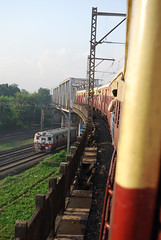


 Die Höhlen, besonders die Haupthöhle, enthält viele große, aber zum Teil stark zerstörten und zum Teil nicht mehr erkennbaren Reliefe. Diese Reliefe zeigen die Taten und unterschiedlichen Aspekten des Gottes, dazu zählen auch dass er
Die Höhlen, besonders die Haupthöhle, enthält viele große, aber zum Teil stark zerstörten und zum Teil nicht mehr erkennbaren Reliefe. Diese Reliefe zeigen die Taten und unterschiedlichen Aspekten des Gottes, dazu zählen auch dass er 
 我想对于对艺术史、考古学或者宗教不感兴趣的人象岛石窟不如其它一些石窟那么可观。除主窟外其它石窟都没有完成,有些甚至还是原始的窟窿。主窟内的大多数浮雕部分被毁(导游说是葡萄牙人做的)。在这种情况下我总是觉得因为知识不足,无法感受所见,而非常惭愧。
我想对于对艺术史、考古学或者宗教不感兴趣的人象岛石窟不如其它一些石窟那么可观。除主窟外其它石窟都没有完成,有些甚至还是原始的窟窿。主窟内的大多数浮雕部分被毁(导游说是葡萄牙人做的)。在这种情况下我总是觉得因为知识不足,无法感受所见,而非常惭愧。